#eorl the young
Text
Playlist for the 25th March
For the Battle of the Black Gate (T.A. 3019):
For the Oath of Eorl (T.A. 2510):
#this happened today#tolkien#the lord of the rings#battle of the morannon#battle of the black gate#oath of eorl#eorl the young#rohan#gondor#Spotify
18 notes
·
View notes
Text
Where now the horse and the rider? Where is the horn that was blowing?
Where is the helm and the hauberk, and the bright hair flowing?
Where is the hand on the harpstring, and the red fire glowing?
Where is the spring and the harvest and the tall corn growing?
They have passed like rain on the mountain, like a wind in the meadow;
The days have gone down in the West behind the hills into shadow.
Who shall gather the smoke of the dead wood burning,
Or behold the flowing years from the Sea returning?
8 notes
·
View notes
Photo
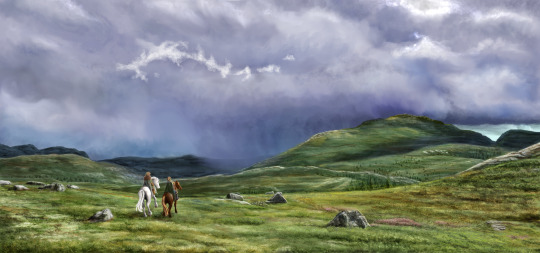
My finished painting for this years @tolkienrsb - Tolkien reverse summer bang! I love this event - this year the incredible @joyfullynervouscreator picked up my prompt and for all of you who loves a good character-driven story you’ve a treat to look forward to! Promo post coming soon.
124 notes
·
View notes
Text
'Eorl the Young was lord of the Men of Éothéod. (...)'
"The Lord of the Rings: Appendices - Appendix A" - J.R.R. Tolkien
#book quotes#lotr#lord of the rings#jrr tolkien#appendices#appendix#annals of the kings and rulers#the house of eorl#eorl the young#eotheod#men
1 note
·
View note
Text
So, we know very little about Faramir and Lothíriel's relationship beyond the facts that a) they're first cousins and b) they marry siblings.
They're first cousins through a particularly important family tie across many cultures (Faramir is her father's sister-son). And although he looks like a young man, he's actually quite a bit older than Lothíriel is. But we have such bare table scraps about Lothíriel herself that there's really very little to go on.
The parallel between their marriages has always interested me, though, even if my take on Éomer/Lothíriel is decidedly unromantic. So I like to imagine that there is a bond of some kind there that influenced that parallel, even if the age gap (and potentially, distance) complicates things and she's the baby of their generation of Adrahil's descendants.
Faramir wouldn't actually describe her as his baby cousin or whatnot, given his speaking style and the norms of their culture, but I can imagine his description of her to Éowyn or Éomer or both giving the impression of someone very young and comparatively dainty. And then it turns out that she's over six feet tall with elaborate black braids, the education, manners, and habits of a Númenórean princess—and, like certain relatives, she has a preternatural command over horses.
#lothíriel headcanons are necessarily very ... headcanon-y but i am really fond of a very tall and very númenórean lothíriel#life in rohan is sometimes very difficult (for her and for them)#but she (like faramir) is a top tier horse girl so there's that#also i imagine that she shares the dol amroth/faramir love of music as well and that helps too#she knows the tale of eorl the young and cirion and all backwards and forwards but the first time she hears the rohirrim's rendition#lothíriel: O_O#anghraine babbles#legendarium blogging#anghraine's headcanon#lothíriel#faramir
80 notes
·
View notes
Text
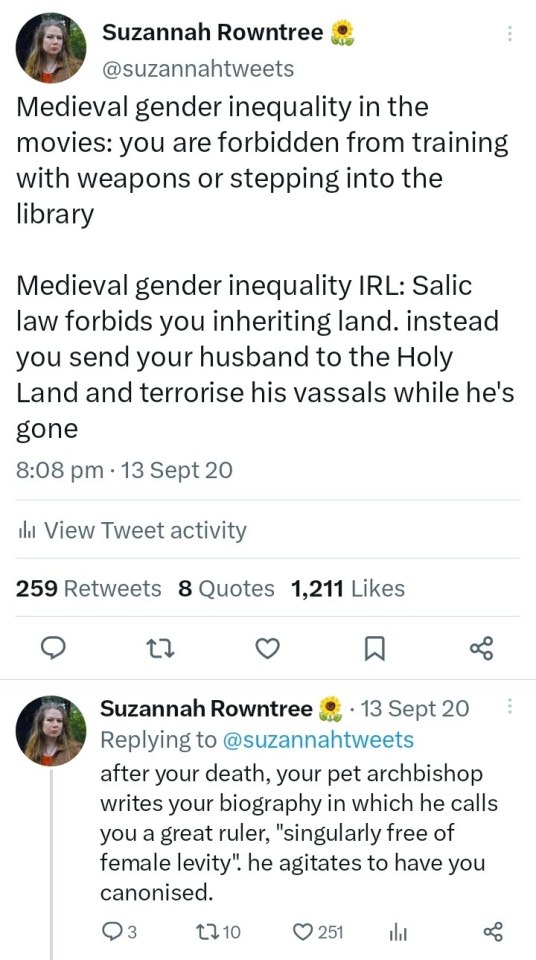
all RIGHT:
Why You're Writing Medieval (and Medieval-Coded) Women Wrong: A RANT
(Or, For the Love of God, People, Stop Pretending Victorian Style Gender Roles Applied to All of History)
This is a problem I see alllll over the place - I'll be reading a medieval-coded book and the women will be told they aren't allowed to fight or learn or work, that they are only supposed to get married, keep house and have babies, &c &c.
If I point this out ppl will be like "yes but there was misogyny back then! women were treated terribly!" and OK. Stop right there.
By & large, what we as a culture think of as misogyny & patriarchy is the expression prevalent in Victorian times - not medieval. (And NO, this is not me blaming Victorians for their theme park version of "medieval history". This is me blaming 21st century people for being ignorant & refusing to do their homework).
Yes, there was misogyny in medieval times, but 1) in many ways it was actually markedly less severe than Victorian misogyny, tyvm - and 2) it was of a quite different type. (Disclaimer: I am speaking specifically of Frankish, Western European medieval women rather than those in other parts of the world. This applies to a lesser extent in Byzantium and I am still learning about women in the medieval Islamic world.)
So, here are the 2 vital things to remember about women when writing medieval or medieval-coded societies
FIRST. Where in Victorian times the primary axes of prejudice were gender and race - so that a male labourer had more rights than a female of the higher classes, and a middle class white man would be treated with more respect than an African or Indian dignitary - In medieval times, the primary axis of prejudice was, overwhelmingly, class. Thus, Frankish crusader knights arguably felt more solidarity with their Muslim opponents of knightly status, than they did their own peasants. Faith and age were also medieval axes of prejudice - children and young people were exploited ruthlessly, sent into war or marriage at 15 (boys) or 12 (girls). Gender was less important.
What this meant was that a medieval woman could expect - indeed demand - to be treated more or less the same way the men of her class were. Where no ancient legal obstacle existed, such as Salic law, a king's daughter could and did expect to rule, even after marriage.
Women of the knightly class could & did arm & fight - something that required a MASSIVE outlay of money, which was obviously at their discretion & disposal. See: Sichelgaita, Isabel de Conches, the unnamed women fighting in armour as knights during the Third Crusade, as recorded by Muslim chroniclers.
Tolkien's Eowyn is a great example of this medieval attitude to class trumping race: complaining that she's being told not to fight, she stresses her class: "I am of the house of Eorl & not a serving woman". She claims her rights, not as a woman, but as a member of the warrior class and the ruling family. Similarly in Renaissance Venice a doge protested the practice which saw 80% of noble women locked into convents for life: if these had been men they would have been "born to command & govern the world". Their class ought to have exempted them from discrimination on the basis of sex.
So, tip #1 for writing medieval women: remember that their class always outweighed their gender. They might be subordinate to the men within their own class, but not to those below.
SECOND. Whereas Victorians saw women's highest calling as marriage & children - the "angel in the house" ennobling & improving their men on a spiritual but rarely practical level - Medievals by contrast prized virginity/celibacy above marriage, seeing it as a way for women to transcend their sex. Often as nuns, saints, mystics; sometimes as warriors, queens, & ladies; always as businesswomen & merchants, women could & did forge their own paths in life
When Elizabeth I claimed to have "the heart & stomach of a king" & adopted the persona of the virgin queen, this was the norm she appealed to. Women could do things; they just had to prove they were Not Like Other Girls. By Elizabeth's time things were already changing: it was the Reformation that switched the ideal to marriage, & the Enlightenment that divorced femininity from reason, aggression & public life.
For more on this topic, read Katherine Hager's article "Endowed With Manly Courage: Medieval Perceptions of Women in Combat" on women who transcended gender to occupy a liminal space as warrior/virgin/saint.
So, tip #2: remember that for medieval women, wife and mother wasn't the ideal, virgin saint was the ideal. By proving yourself "not like other girls" you could gain significant autonomy & freedom.
Finally a bonus tip: if writing about medieval women, be sure to read writing on women's issues from the time so as to understand the terms in which these women spoke about & defended their ambitions. Start with Christine de Pisan.
I learned all this doing the reading for WATCHERS OF OUTREMER, my series of historical fantasy novels set in the medieval crusader states, which were dominated by strong medieval women! Book 5, THE HOUSE OF MOURNING (forthcoming 2023) will focus, to a greater extent than any other novel I've ever yet read or written, on the experience of women during the crusades - as warriors, captives, and political leaders. I can't wait to share it with you all!
#watchers of outremer#medieval history#the lady of kingdoms#the house of mourning#writing#writing fantasy#female characters#medieval women#eowyn#the lord of the rings#lotr#history#historical fiction#fantasy#writing tip#writing advice
29K notes
·
View notes
Text

Eorl the Young by Alan Lee
328 notes
·
View notes
Text
Eowyn tells Faramir it isn't necessary to write all of Rohan's songs and legends in a book lest they be forgotten. The Rohirrim do not read and write: they are oral storytellers, and they have great respect for their minstrels and their history. They will not forget anything.
She says it to reassure him and save him the trouble, but it does not seem to soothe his mind.
He smiles quickly at her before turning to the window. He looks out at the hills of Emyn Arnen as though watching for a storm on the horizon, and then Eowyn understands.
She grasps his hand.
At his touch, an image rushes through her mind: a grey, mutinous sea; and among the froth and the fury – sodden books, orphaned heirlooms, and a tapestry that will never again be seen or re-made, with both story and skill lost to the devouring waters.
The water washes over them both before slowly receding, leaving only a mist that she blinks away, and the distant glint of the Anduin to the west as it flows down to the Sea.
'Have I ever told you of Eorl the Young?' she says. Her voice is rough; she clears her throat.
'We know much about Eorl in Gondor,' Faramir says softly. 'His friendship with Cirion and his aid in our time of need was great.'
'And what about after?' she asks. 'What does Gondor know about that?'
Faramir turns to her with a wry smile. 'Very little.'
'Would that you had someone to teach you a little history.'
The mirth in Faramir's eyes mirrors her own.
'Would that I did.'
#AAAAAAAAHHHHHHHHHHHHHHHHHHHHHHHHH MY SAD NUMENOR MAN#this was meant to be a text post idk what happened#faramir#eowyn#farawyn#tolkien#lotr#my fic#oneringnet#lotr: fic#*lotr#lord of the rings#lotr fic
506 notes
·
View notes
Text
Tolkien and long hair: what do the books say?
Any time Tolkien describes the length of Elves’ hair, it’s always said to be long:
- Glorfindel: ‘His golden hair flowed shimmering in the wind of his speed’ (FOTR
- Amroth: ‘The wind was in his flowing hair’ (FOTR)
- Celeborn: ‘The hair of the Lord Celeborn was of silver long and bright’ (FOTR)
- Elves even made bowstrings from their hair: ‘A bow such as the Galadhrim used, longer and stouter than the bows of Mirkwood, and strung with a string of elf-hair’ (FOTR)
- Celegorm: ‘Golden was his long hair’ (The Lays of Beleriand)
- The Elves of Valinor: ‘With their gleaming hair in the wind flying’ (The Lays of Beleriand); ‘There blowing free unbraided hair is meshed with beams of Moon and Sun’ (The Lost Road)
- The Teleri: ‘With their long hair gleaming like foam’ (Morgoth’s Ring)
- Olwë: ‘The hair of Olwë was long and white’ (Morgoth’s Ring)
- Thingol: ‘Elwë himself had long and beautiful hair of silver hue’ (The War of the Jewels)
- Fingon: ‘He wore his long dark hair in great plaits braided with gold’ (The Shibboleth of Fëanor)
- And then there’s this quote which implies that long hair was seen as desirable among the Elves: ‘All the Eldar had beautiful hair (and were especially attracted by hair of exceptional loveliness), but the Noldor were not specially remarkable in this respect, and there is no reference to Finwë as having had hair of exceptional length, abundance, or beauty beyond the measure of his people’ (The Shibboleth of Fëanor)
But it’s not just Elves—Men are also described as having long hair:
- Aragorn: ‘He threw back his hood, showing a shaggy head of dark hair flecked with grey’; ‘His hood was cast back, and his dark hair was blowing in the wind’ (FOTR)
- The Witch-king of Angmar: ‘His hair was long and gleaming’ (FOTR); in an earlier draft of the scene, Tolkien wrote that all the Ringwraiths had long hair: ‘Upon their long grey hair were crowns and helms of pale gold’
- Boromir: ‘They combed his long dark hair and arrayed it upon his shoulders’ (TTT)
- The Rohirrim: ‘Their hair, flaxen-pale, flowed under their light helms, and streamed in long braids behind them’; ‘Where is the helm and the hauberk, and the bright hair flowing?’; ‘Their golden hair was braided on their shoulders’ (TTT)
- Eorl the Young: ‘His yellow hair was flying in the wind’ (TTT)
- Théoden: ‘His white hair was long and thick and fell in great braids’ (TTT); ‘The hair that flowed beneath his high helm was like snow’ (ROTK)
- Men from the South: ‘They have black eyes, and long black hair’; ‘His black plaits of hair braided with gold were drenched with blood’ (TTT)
- Faramir and Éowyn: ‘And so they stood on the walls of the City of Gondor, and a great wind rose and blew, and their hair, raven and golden, streamed out mingling in the air’ (ROTK); this would only be possible if Faramir also had long hair
- Túrin: ‘For his garb was of the wild woods and his hair was long’ (The Book of Lost Tales)
What about Maiar?
- Gandalf is described as follows: ‘His long white hair, his sweeping silver beard, and his broad shoulders, made him look like some wise king of ancient legend’ (FOTR); ‘His snowy hair flew free in the wind’ (TTT)
- Even the Balrog is described as having long hair: ‘Its streaming hair seemed to catch fire, and the sword that it held turned to flame’ (The Return of the Shadow)
Interestingly, I only found a few instances of characters cutting their hair short, and all of them are women:
- Lúthien cuts her hair in The Silmarillion, although it does not say how short, but in The Lays of Beleriand, it says she ‘cut the hair about her ears, and close she cropped it to her head’
- Vána cuts her hair too in The Book of Lost Tales: ‘There follows an account of how Vána...cut short her golden hair and gave it to the Gods, and from her hair they wove sails and ropes’
- In The War of the Ring, Éowyn is described with shorn hair when she goes to war, although this was changed in the final version of ROTK: ‘In the passage that follows, Éowyn’s hair is described as shorn upon her neck’
In conclusion, long hair is clearly the norm in Tolkien’s books. No Elf is ever described as having short hair apart from Lúthien, and no mortal is ever described as having short hair except for Éowyn in the rejected draft. If anyone should have short hair, it’s certain female characters, not male Elves. Fight me!
#tolkien#silmarillion#lotr#my writing#long hair#yes I did in fact do a word search for ''hair'' in a digital copy of LOTR#and looked at all the iterations of it#and then I did a word seach for ''hair'' in a digital copy of all the volumes of HoMe... and there were over 400 mentions#and I looked at all of them#fuck Amazon#and their stupid modern gender-normative aesthetics
2K notes
·
View notes
Note
I would absolutely love to hear literally any random thought you have about Eomer or Boromir.
Hee! What a wonderful Ask! But oh my goodness, this is a little tricky because just thinking of either of those two kind of torches what few brain cells I have left because they're just so... you know. ;)
I do have timeline notes for these two wonderful Men because I'm finally starting my multi-chapter fics for them. However, I don't want to spoil anything, so lemme check what headcanon is spoiler free....
Quick Headcanon: EOMER
Eomer's military career can be summarized as follows:
Ages 12-15 - Served as squire to King Theoden
Age 16 - Accepted as Rider in the Eored of his cousin, Theodred
Age 20 - Given command of his own Eored
Age 26 - Becomes the Third Marshal of the Mark
Eomer is a prodigious soldier, often deemed the greatest Rohirrim since the days of Eorl himself. This is the result of natural (almost supernatural) talents and a fierce dedication to his country. He envisioned himself as serving as a soldier his whole life and never had any political aspirations.

Quick Headcanon: BOROMIR
Book canon states that Boromir had little interest in taking a wife because he was too preoccupied with learning the ways of warfare so he could protect his beloved City. This certainly was true when he was younger, because settling down wasn't a priority in his mind.
But I also headcanon that young Boromir was a "good soldier" a.k.a. good at taking orders. This was part of why Denethor loved him so much; he didn't deviate from "The Plan". Basically The Plan was to inherit the Stewardship and rule Gondor after his father. Oh, and he was going to marry and have kids and continue the prestigious bloodline.
Denethor assigns his sister-in-law, Ivriniel, to find a good match for his son for whenever the right time came.
Good Soldier Boromir says, mindlessly: "Yeah, okay, sure. Whatever, Auntie." He was ready to do as he was told and just let them pick his "perfect" wife for him.
But then he did the unthinkable and fell in love. With a commoner. A commoner with a far-less-than-ideal background.
That's not THE PLAN, Boromir! You're not supposed to have opinions!
And you can bet Lady Ivriniel is gonna make a damn good impression of Lady Catherine de Bourgh when she finds out and it's gonna make for some Austen-ian drama.
(All this coming in the Boromir fic I have in the works.)
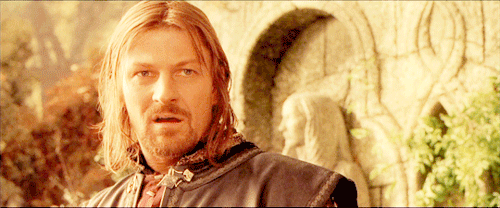
Tagging just a few fans who might be interested: @scyllas-revenge @ass-deep-in-demons @hippodameia @hobbitwrangler @konartiste @emmanuellececchi @thetempleofthemasaigoddess @heilith @absentmindeduniverse and I'm sure I've missed people but like I said my brain cells are probably fried from thinking about these two. XD

Other useful links:
Introduction to SotWK
Fanfiction Masterlist
Fanfiction Request Guidelines

46 notes
·
View notes
Text
Into the Breach (Part 3 of 4)

In which Théodred has a catastrophic encounter with Théoden and Gríma and makes a fateful decision in response. Catch up on parts one and two if needed. This is all my collective attempt to remind the world that Théodred was not just an off-page plot device to service Éomer’s storyline but an actual person with his own feelings and plans and fears and hopes. Also, as a reminder, the guy on the left below is my Théodred (drawn by the lovely Valeria Salo @valerisalo, bonus points to anyone who can identify who the reference guy was!) and, as in the books, he's in his 40s and unmarried (though currently engaged to an age-appropriate partner). Part 4 is next week.


The inside of the great hall was in hushed contrast to the bustle of the streets outside. Mild morning light shone down from the high windows below the eaves and dust motes floated in the few rays strong enough to mark themselves across the colored stone floor. The fire in the main hearth had not yet been fully banked, and the air still had a cool chill. No voices or footsteps could be heard, but at the far end of the hall, under an embroidered tapestry of Eorl the Young, was a large gilded chair, and in that chair sat the shrunken, hunched figure of an elderly man with his eyes cast downward. Théodred ran to him and knelt at his side.
“Father!” Théodred swallowed down his horror at the sight of Théoden’s wizened appearance. If anything, Éomer had understated the dramatic change to have taken place since Théodred had last been here three weeks before. He reached out to cover one of his father’s hands with his own. The fingers under his palm were cold, the skin papery. “Father, can you look at me?”
Slowly, the old man looked up. His blue eyes were cloudy, and he stared for several moments before a light of recognition kindled deep within. “Théodred. My son.” His voice was low and hoarse, and his last word lilted upward at the end as though it was a question.
Théodred smiled and nodded. “Yes, father. It’s me. I’m sorry that I’ve been away, but I’m here now. I’m here to help you.” He rested his other hand gently on his father’s arm, shuddering at the new frailty of that once mighty limb.
“He asks for no help.” A cold, flat voice came from Théodred’s left, and he turned to see Gríma approaching. His face was stern and pinched, his gaze keen and disapproving. “And it is insubordinate of you to even suggest that he needs it. But by your very presence in this hall, you have already shown yourself to be one who has no regard for rules and authority.” He shot a disgusted look at Háma. “Unless the doorwarden here has neglected to inform you of your father’s latest order.
Théodred rose to his feet but kept his hand firmly on Théoden’s arm. “Your fight is with me, not Háma. I have seen your order, but I don’t accept it. And I will not, unless I hear it from my father’s own lips.” He looked down again at Théoden, whose eyes had drifted back to the floor and gave no outward reaction to what was transpiring around him.
“He expressed his wishes to me, and I faithfully recorded them.” Gríma circled around Théodred slowly, a wary eye on him at all times. “He wouldn’t have stamped the order otherwise.”
“Why don’t you let him speak for himself?” Théodred’s words came out louder than he intended, and his voice echoed in the otherwise silent hall.
“There is no need,” Gríma shot back. “It’s a lawful order. Just because you don’t like it doesn’t make it any less valid.”
A spark of fury lit inside Théodred, and the heat of it spread quickly to his face and limbs. He flexed his hand, feeling an itch in his fingertips that would only be satisfied by the grip of his sword. But even as his fury rose, another voice inside him cautioned against rash action. Losing his temper would not help his father, the voice insisted, nor would it convince Gríma to be more reasonable. And unrestrained violence against an unarmed opponent was not his way. It was not who he was.
He yielded to the voice and took several deep breaths to dampen his anger, forcing back all of the instincts that thrummed through him to settle this matter quickly by fist or blade. He spoke instead through firmly gritted teeth. “And on what grounds have you determined that my presence here is impermissible?”
Gríma came to a stop behind Théoden’s right shoulder, his elbow resting casually on the back of the throne. Théodred eyed that elbow, wanting nothing more than to swat it away like a nuisance fly. “If you must know, the king has determined that you are not to be trusted. That you scheme to usurp his place–taking over his duties, putting yourself into roles and positions that are rightfully his, always pushing for conflict with Isengard just so you can pursue battlefield glory for yourself. Next, I expect you will begin to tell the people not to listen to him but rather to you. Indeed, that is exactly what you’ve just done by convincing this guard”—he gestured vaguely in Háma’s direction—“to defy the king’s orders for your own benefit. That is the first step to open revolt. The king has been generous only to ban you from the hall when what you really deserve is banishment from the kingdom. That would have been my recommendation, and it may yet come to be.”
Théodred’s eyes flashed. “You must think me stupid to believe that my father would have such thoughts. He knows that everything I do is in service of him and of Rohan. I have no desire to be king, and I would happily spend the rest of my life as nothing but his heir if the gods would only let him live that long.” He knelt down again at Théoden’s side and searched his father’s face for some further sign of recognition or understanding. “Father, please speak to me. I will do anything you ask.”
Gríma snorted. “Now you claim obedience, but when have you ever been so? Your father has made it clear that he doesn’t want an open confrontation with Saruman, and yet we hear regular reports of you engaging with forces of Isengard in the West-mark.”
Théodred looked up sharply. “And what would you have me do? Sit back and watch as Saruman takes our land acre by acre, uncontested? I start no quarrels with Isengard, as directed, but I will defend our people when they are threatened and attacked. That has always been the policy of this kingdom.”
“Well, current policy is under review. And I expect you will hear changes announced soon.”
Théodred gaped at him in disbelief. “That would be madness. You might as well hand Saruman everything from the Isen to Helm’s Deep if you insist on such foolishness.”
“I advise you to watch both your tone and your words,” Gríma snapped. “These are the decisions of your father–of your king–that you are castigating. Your disagreement is irrelevant.”
“My father and I had no disagreement before you insinuated yourself so deeply into this court!” Hot anger coursed through Théodred’s veins, and his will to hold it back strained and frayed dangerously.
“Is that so, my lord?” Gríma nearly spat Théodred’s title at him. “Your view of the past is clouded by your desire to paint yourself as a hero. Because I seem to recall many times when you and your father were at odds. Or have you forgotten Cynewine?”
“You don’t know what you’re talking about, Wormtongue.”
“I know that your refusal of that match cost your father an important political alliance and cost you an opportunity to do your only real job of producing another heir. And for what? Your own foolish romantic hopes? That sounds less like obedience and more like self-indulgence to me. And those years of self-indulgent waiting have left you now betrothed to a woman who is well past her prime and will be lucky to give you a child of any kind, let alone the son we require. No one could call that respect for your father’s wishes.”
In an instant, Théodred’s fury erupted into the open, tearing through his body like flames through a field of dried grass. Every pained moment of worry for his father, his cousins, his soldiers, his country now poured out of him in pure rage, ignited by this casual cruelty aimed at the woman he loved most in the world. The restraining voice in his mind vanished, and he let out a roar as he jumped to his feet.
Gríma’s mouth dropped open in surprise and he attempted to scuttle backwards, but in two quick steps Théodred had already reached him, catching hold of his shirt and looming over him with his sword poised in the air above his head. Gríma shrank down, all of his bluster and haughtiness gone, and waited for the inevitable blow to fall, but another arm quickly intruded between the two men.
“Théodred!” Háma, wild-eyed and red faced, pushed his way in front of the prince, forgoing all sense of protocol in his urgency. “Théodred, you don’t want to do this. At least, not here. Not in this place, and not in front of him.” His eyes looked back to Théoden.
Théodred hesitated, following Háma’s glance but maintaining his hold on Gríma. The prospect of dishonoring the rule of his father or the sanctity of the king’s hall gave him immediate pause. But had he not already allowed this nonsense with Gríma to go too far? If he gave up this opportunity to end it, he might not get another.
Háma read the conflict in Théodred’s eyes and put a calming hand on his friend’s shoulder. “You’ll find another way. One that is worthy of you.” With his other hand, he gently extracted Gríma’s shirt from Théodred’s grip, and Gríma stumbled backwards in a rush to put distance between himself and Théodred’s sword.
Théodred slowly lowered his weapon and eased backward a step or two of his own. He felt at once that he had done the right thing and also that he had made a terrible mistake, and the uncertainty tore at his mind. Perhaps both could be true at the same time. But now he had made a choice–the choice of honor–and he would stick to it.
His mind raced through options of what to do next. Something was deeply wrong in this hall, worse than he had imagined and still beyond his understanding. If only he could speak to his father alone, maybe then he could truly see what was happening and how to fix it. But first he would need his father to put Gríma in his place, to disavow any notion that Théodred was to be kept from his rightful place at the king’s side. He looked up and fixed Gríma with a cold stare.
“We have still between us the issue of my right to be here. I tell you now that I do not and will never accept your word on this matter. Only my father alone could stop me from serving him as I see fit.”
Gríma returned the stare for several long moments before his manner abruptly changed, as though he had reached some important new decision in his mind. His lips curled into an unctuous smile, and he took several slow steps in Théodred’s direction with his hands spread out plaintively before him. “Well, it pains me deeply, my lord, that you believe I would ever be dishonest, particularly on a matter of such importance. But if you require it, then by all means, let’s just ask your father directly. Shall we?” He bent down next to Théoden and put a hand on his shoulder. The touch seemed to immediately rouse the king from his daze. He sat up straighter and looked expectantly at Gríma.
“My lord, you and I spoke at length this morning about your distrust of your son and your desire to see him refused entry to the hall. And yet, your son does not believe this to be true. He stands before you even now.” His voice was cajoling, as one who speaks to a recalcitrant child, and he tightened his grip on the king’s arm. “Tell him, my lord. Tell him that he is no longer welcome.”
Théoden turned his head slowly toward Théodred, who dropped again to his knees before his father and seized both of his hands. He looked imploringly into Théoden’s rheumy eyes but struggled to find the light of affection there.
Théoden drew a slow breath and spoke, still hoarse but clearer and louder than before. “I do not trust my son, and I do not wish to see him again. That is my final word on the subject.”
Théodred felt the sting of those words like a slap across the face. He sank further down toward the floor, his father’s hands slowly slipping from his grasp, and heaved in a few ragged breaths. Somewhere to his side he heard the laughter of Gríma and the indignant response of Háma, but they sounded muffled and distant. He stared down at the red stone beneath his knees, unwilling to blink and send the tears that had sprung to his eyes sliding down his cheeks.
“This way, my lord.” A strong hand wrapped around his elbow and pulled him to his feet. Háma guided him gently but firmly away from the gleeful triumph of Gríma and from the shell of his father who sat unmoving at Gríma’s side, seemingly unaware of his son’s distress. “There’s no good to come of lingering here right now. Unless you would fight the king himself, this battle is lost. But there will be others, and gods help us, you will win those.”
Háma pulled him out to the terrace where Théodred paused, his mind reeling and his feet shaky beneath him. All around them, people went about their daily business. Merchants carried goods to the market, parents chased after rambunctious children, soldiers from the Edoras garrison led horses out to the training ring. Each one to walk by acknowledged their prince, giving a small bow or smiling and wishing him well, happily ignorant of the drama that had just unfolded within the hall.
“They still look to you as a leader,” said Háma, gesturing toward the passersby. “They don’t know it, but they are counting on you to pick yourself up and find a way forward. They need you now more than ever.”
Théodred forced himself to look up, to tear his focus from the ache in his chest to the faces of the Rohirrim all around him. Many he knew, some he didn’t. But they were all his people, and they all stood now on the very edge of disaster, one that they did not and could not fully appreciate. They relied on their king to protect them, but his father was in no condition to fulfill that duty, neither physically nor mentally. Whether it was Gríma’s doing or naturally caused, Théoden was not up to the task. And so it was clear to Théodred now that he had an excruciating choice to make: to defy orders and act on his own to fulfill his father’s duties to his kingdom, or to stand by and allow both father and kingdom to be destroyed by the treachery of Gríma and the aggression of Saruman.
A young family passed by, the wife carrying a small infant bundled up against the late February cold, and Théodred’s eye lingered on that little bundle. His father had always loved babies–he said they reminded him of the promise of the future–and he would stop and admire any infant to come across his path, delighting in their rounded little cheeks and tiny, reaching fingers. He was never too busy to dote on the very youngest of his subjects or to join their parents in joy at the addition to their family. Now, as Théodred watched this baby being carried down the street and off to its home, he felt his will harden within him again. Théoden–the real Théoden–would want to protect that baby’s future. And if he couldn’t do it, he would want Théodred to stand in his place, no matter what words Gríma managed to plant in his mouth.
Théodred drew himself up and stiffened his spine. Háma felt the change and released his grip on the prince’s arm.
“You’re right, Háma. This was just the opening salvo in what may be a long struggle, and I need now to think and plan.” He looked back toward the closed door behind them. “Our first priority must be to protect the king. As long as Gríma hides behind my father, I can’t touch him, but if he is responsible for this illness then he must be stopped. We need eyes on him as often as possible to figure out once and for all what he’s doing and how, but it seems those eyes cannot be mine. Can I count on you to watch him and report to me whatever you learn?”
Háma nodded. “Of course. Everything I know, you’ll know.”
Théodred put a hand on his shoulder. “Thank you, Háma. I know your oath is to my father and not to me, and I don’t mean to put you in a difficult position by asking things of you while I am out of his favor.”
“There is more than one way to fulfill an oath, my friend.” Háma smiled and tapped a fist against Théodred’s chest before turning to head back inside.
Through the open entryway, Théodred caught a last glimpse of Théoden, quiet and forlorn on his throne, and kept his eyes on him until the closing door at last cut off his view. Alone on the terrace, he breathed out a soft sigh, turned on his heel, and hurried away.
Part four is here.
****************
@sotwk @emmanuellececchi As requested! (Also, I am not this fast at writing—I wish!—but I wrote all 4 parts together so I’m just posting them every few days or so.)
#did you ever wonder what théodred was doing#in the run-up to LOTR events?#look no further#théodred my beloved#lotr#lord of the rings#tolkien#rohan#théodred#theodred#háma#hama#théoden#theoden#grima wormtongue#dividers by saradika
26 notes
·
View notes
Text
Like a god of old
For @cilil
At first, there is only darkness, like mist on a winter morning. Then there is a glow not unlike dawn piercing through clouds and Théoden blinks, surprised to be able to see. He takes a breath in, shocked not to hear his lungs rattle and feel his chest ache, before noticing he does not need to breathe anymore. He breathes in again anyway, relishing in the lack of pain. If this is death, Théoden thinks, it is a hundredfold better than his last years of life. Only then does he notice the presence beside him, just at the edge of his vision.
Careful, Théoden sits up, marvelling at how easy it is, and look at the being. He looks like an old man, in the dim light, yet his stature is strong and his face unlined by the years. Théoden peers at his face, half hidden in the shadows, and feels his breath hitch. “Father?” he asks quietly, for the man looks like Thengel as he was in his prime. Yet something is off.
The man smiles and his features shift just the slightest, and he bears now a face Théoden knows from countless carved statues and innumerable descriptions in songs. “In a way,” the likeness of Eorl the young says, voice deep as the woods. “I am you father as I am the father of your forefathers, of countless warriors and hunters from Ages past, Théoden Ednew son of Thengel.”
The man’s - no, the god’s - face shifts again, taking the appearance of a dark-haired Elf of noble bearing, and Théoden looks at him in awe. “Béma, my Lord,” he whispers in awe. “So I am well and truly dead, in the Halls of my Fathers…”
This last addition is mostly for him, more a whispered thought than anything else, but Béma still answers. “You are dead indeed, Théoden King, and your death was bold and glorious like few before you. But this is not the halls of your fathers, but the Halls of Mandos. This is but a step in jour journey. Come, walk with me.”
Stunned, Théoden grasps the god’s outstretched hand to help him stand. The motion is strangely fluid, the old ache in his hip gone as if his body is more thought than flesh. Of course he cannot feel pain, he muses, he is dead and his body must be a memory of sorts, an old image he clings to.
Béma leads Théoden through vast halls shrouded in mist, the place eerily silent for their feet do not make a sound on the ground. “I heard of your valour, son of Rohan,” Béma says almost conversationally. “I looked over you on the Tapestries and saw your fate. Be proud, for your end was not in vain and brought a new Age in its wake.”
“I was but an old man riding to his death in despair,” Théoden answers without thinking. He glances at the god walking beside him, and finds he is changed again. Gone is the noble Elflord, replaced by a tall and rugged hunter. Théoden thinks he sees shadows of antlers about his head. “I did my duty to my people after I let them suffer for too long.”
There is a silence before Béma speaks again. “You were despairing indeed, knew you were riding to your death, and yet you met it in your own terms. This demands no small amount of courage, Théoden King. I heard songs already comparing you to me, charging the enemy with fury and might…”
Théoden suddenly feels like a boy barely of age and ducks his head. “They mean no ill, Lord Béma,” he says almost bashfully. “And most certainly my deeds are made grander than they are.”
The god laughs, a deep, rumbling sounds that reminds Théoden of galloping hooves pounding the ground. “Old tales are made to be sung again and again, and I have no grudge against the bards likening you to me, son of Rohan. And I may even say that they are more flattering to me than you. For, you see, I am made for battle and blood, while you had to shape yourself for this role in pain and despair. And you turned this despair to rage, to strength to face your enemy head on in a way I will never be able to. Yes, you are strong, Théoden King, and worthy of all the songs that will be sung about you in the Age to come. But we reached the path you have to take now, I cannot go forward.”
Indeed, they stopped walking, and they are facing doors that look carved out of the very mist that bathe the place. Théoden runs his hand, calloused but smooth of any wrinkles, on the shifting shapes of the doors. He sees a child crying, a woman falling down a ravine, a king lying down to sleep, a woman with her babe in her arms closing her eyes. He breathes in, for the last time he knows, and look back at Béma.
“My Lord, I am honoured you took the time to lead me here,” he says with a bow of his head, so light without a crown resting on his brow.
“The honour was mine, son of Rohan. Go now, your time has come to take this road.”
Théoden closes his hand on the door handle, hesitate. Breathes out. Looks back at Béma once more.
“Your forefathers await you, Théoden King. They are proud of you,” the god says with a warm smile that remind Théoden of his mother’s smile.
Théoden nods at Béma, smiles back and open the doors.
Inspired by this post: https://www.tumblr.com/curiouselleth/746143860815740928/the-ghost-of-jrr-tolkien-rising-from-the
55 notes
·
View notes
Text

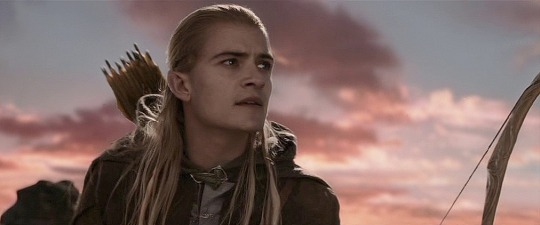

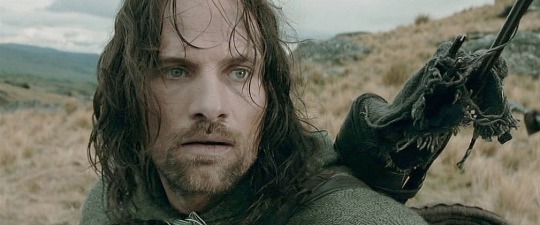


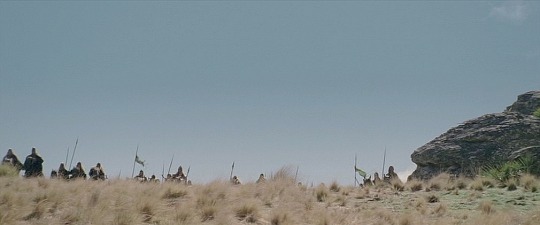

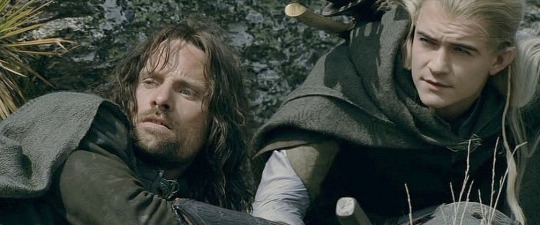
Following with his keen eyes the trail to the river, and then the river back towards the forest, Aragorn saw a shadow on the distant green, a dark swift-moving blur. He cast himself upon the ground and listened again intently. But Legolas stood beside him, shading his bright elven-eyes with his long slender hand, and he saw not a shadow, nor a blur, but the small figures of horsemen, many horsemen, and the glint of morning on the tips of their spears was like the twinkle of minute stars beyond the edge of mortal sight. Far behind them a dark smoke rose in thin curling threads.
There was a silence in the empty fields, arid Gimli could hear the air moving in the grass.
'Riders!' cried Aragorn, springing to his feet.
'Many riders on swift steeds are coming towards us!'
'Yes,' said Legolas, 'there are one hundred and five. Yellow is their hair, and bright are their spears. Their leader is very tall.'
Aragorn smiled. 'Keen are the eyes of the Elves,' he said.
'Nay! The riders are little more than five leagues distant,' said Legolas.

'Five leagues or one,' said Gimli; 'we cannot escape them in this bare land. Shall we wait for them here or go on our way?'
'We will wait,' said Aragorn. 'I am weary, and our hunt has failed. Or at least others were before us; for these horsemen are riding back down the orc-trail. We may get news from them.'
'Or spears,' said Gimli.
'There are three empty saddles, but I see no hobbits,' said Legolas.
'I did not say that we should hear good news,' said Aragorn. 'But evil or good we will await it here.'
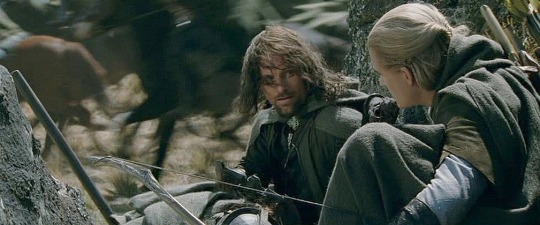
The three companions now left the hill-top, where they might be an easy mark against the pale sky, and they walked slowly down the northward slope. A little above the hill's foot they halted, and wrapping their cloaks about them, they sat huddled together upon the faded grass. The time passed slowly and heavily. The wind was thin and searching. Gimli was uneasy.
'What do you know of these horsemen, Aragorn?' he said. 'Do we sit here waiting for sudden death?'
'I have been among them,' answered Aragorn. 'They are proud and wilful, but they are true-hearted, generous in thought and deed; bold but not cruel; wise but unlearned, writing no books but singing many songs, after the manner of the children of Men before the Dark Years. But I do not know what has happened here of late, nor in what mind the Rohirrim may now be between the traitor Saruman and the threat of Sauron. They have long been the friends of the people of Gondor, though they are not akin to them. It was in forgotten years long ago that Eorl the Young brought them out of the North, and their kinship is rather with the Bardings of Dale, and with the Beornings of the Wood, among whom may still be seen many men tall and fair, as are the Riders of Rohan. At least they will not love the Orcs.'

'But Gandalf spoke of a rumour that they pay tribute to Mordor ' said Gimli.
'I believe it no more than did Boromir,' answered Aragorn.
'You will soon learn the truth,' said Legolas. 'Already they approach.'
At length even Gimli could hear the distant beat of galloping hoofs. The horsemen, following the trail, had turned from the river, and were drawing near the downs. They were riding like the wind.
Now the cries of clear strong voices came ringing over the fields. Suddenly they swept up with a noise like thunder, and the foremost horseman swerved, passing by the foot of the hill, and leading the host back southward along the western skirts of the downs. After him they rode: a long line of mail-clad men. swift, shining, fell and fair to look upon.

Their horses were of great stature, strong and clean-limbed; their grey coats glistened, their long tails flowed in the wind, their manes were braided on their proud necks. The Men that rode them matched them well: tall and long-limbed; their hair, flaxen-pale, flowed under their light helms, and streamed in long braids behind them; their faces were stern and keen. In their hands were tall spears of ash, painted shields were slung at their backs, long swords were at their belts, their burnished skirts of mail hung down upon their knees.
In pairs they galloped by, and though every now and then one rose in his stirrups and gazed ahead and to either side, they appeared not to perceive the three strangers sitting silently and watching them. The host had almost passed when suddenly Aragorn stood up, and called in a loud voice:

'What news from the North, Riders of Rohan?'
With astonishing speed and skill they checked their steeds, wheeled, and came charging round.

JRR Tolkien, The Lord of the Rings, The Two Towers, The Riders of Rohan
The picture of Eorl the Young in the Golden Hall of Meduseld (painted on heavy canvas) is taken from the Appendices: The Two Towers - 'Designing Middle Earth'
#the lord of the rings#the two towers#the riders of rohan#jrr tolkien#rohan#aragorn#legolas#gimli#eomer#peter jackson#extended edition#movie pics
43 notes
·
View notes
Text
Obscure Tolkien Blorbo: Round 1
Eorl vs Meássë
Eorl:
Known as “the Young” because he became Lord of the Éothéod at only sixteen. Founder of Rohan.
Taming an untameble horse and demanding he carry him as a weregild for killing his father? What's not to love?
Meássë:
A warrior Vala from an early draft of the legendarium, sister of Makar.
She's described as being fierce and having bloody arms and i just think that's neat
She's a warrior Vala with bloody arms who thinks Valinor is for the Valar only. Silmarillion Valar are way too squeaky clean. Meássë makes them much messier and more interesting.
Round 1 masterpost
78 notes
·
View notes
Text
A while back I found an essay I'd written for English class in high school where I referred to Eorl the Young as "Middle Earth's King Arthur" and I desperately, desperately, desperately wish I knew what the fuck 16-year-old Natalie meant by that
77 notes
·
View notes
Text
'Not in half a thousand years have they forgotten their grievance that the lords of Gondor gave the Mark to Eorl the Young and made alliance with him. That old hatred Saruman has inflamed.'
The men of Dunland were amazed; for Saruman had told them that the men of Rohan were cruel and burned their captives alive.
A few things:
- it is wrong to send an army to go kill a bunch of people, obviously.
- Saruman lied to the men of Dunland, was not a trustworthy ally, and did not have their best interests at heart. Following him? Bad choice.
- Nevertheless the men of Dunland probably have not forgotten Gondor's "gift" of land to Rohan for a reason. Was that their land?? Sure seems like it might've been.
- Their relief that Rohan isn't going to torture the survivors should not be taken as evidence that there is no legitimate grievance or that Rohan has done no wrong to these people at all.
- I'm side eyeing the hell out of 'we pardon you for attacking us but you must swear an oath never to cross the river in arms again' in the same breath as telling them they may return "free" to their land. Yes, it would be great if no one ever marched anywhere in arms but what right does Rohan have to demand this oath? It's a means of protecting their people, great, but what Right have they and Why do they make no similar pledge? I'd sure like to know what the political situation is between these two because the fact is I don't, and this story doesn't focus on it, but the picture it's painting makes me feel icky.
On Commentary:
- the purpose of pointing out potentially colonialist narratives in fiction is not to fling accusations or win social awareness points. The way we interact with fiction is entwined with the way we act irl towards real people, and the goal here is to collectively root out gross frameworks of thought that are baked into us by the powers that be that profit from injustice. Team work makes the dream work
- it is because I enjoy lotr so much that I devote thought to being critical of it. (Hell, this is barely even criticism.) This is learning, not mudslinging. "Bad person for enjoying media" is not a game we play in my house.
-Characters behaving badly is not evidence that the author is ignorant or malicious, or that he isn't, and in fact authorial intent is entirely beside my point at the moment. The text must be able to stand on its own. Deciding which people are Good (aware) and Bad (ignorant) is silly, unhelpful, and a distraction. No one is immune to bias, and no one is incapable of change.
#bit late on the posting my head fucning hurtssss lol#colonialism in tolkien#lotr newsletter#lotrn304#the oath thing just bothers me#dont march in arms like ok but You just did and i dont see anyone calling that unjust#the blanket forbidding of it smells like 'you will never have a legitimate reason to do so bc i said so. not like us#and the buying of that oath with mercy is like.......gross#idk there is like no info on their tensions so...whatever but like <_<#food for thought#im also rly curious abt what the dunland guys call themselves bc uhhhhh yeah that's another layer to it
9 notes
·
View notes